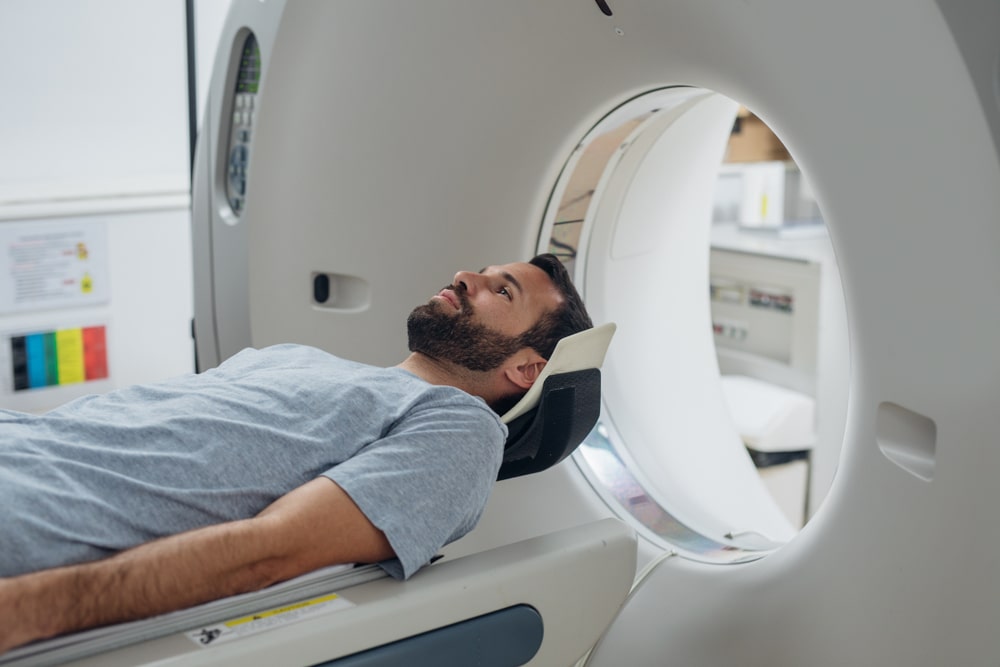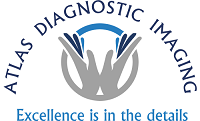CT-Scan

During a CT scan, a patient lies on a table, which slides into a large tube. The tube contains an x-ray machine that takes photos of the inside of the body. Usually, the entire process takes about 15 minutes and is painless. The pictures taken during the scan get sent to a computer. A technologist can assemble the photos to create a 3D image to give to the doctor. It’s also possible for a physician to evaluate the images separately.
Do your best to get ready before a CT scanning.
The following are a few items you should know about before CT scan :
If you have any allergies, especially to iodine or x-ray contrast, let your doctor know. For some CT scanning tests, an intravenous iodine dye (or contrast) is administered. You will be given medicine to take before the test if you have an allergy.
Before the CT scan, a blood test (creatinine) will be performed to ensure that your kidneys are healthy if you have a history of kidney issues or diabetes. In patients with impaired kidney function, the intravenous contrast substance used during a CT scan can harm the kidneys.
Important points before you go for CT scanning :
- When you go for CT scanning, dress comfortably; in some situations, a hospital gown will be provided for you to wear.
- Before your CT scan, you will receive instructions regarding whether you can eat or drink anything.
- Unless your doctor has instructed you otherwise, take your medication as directed.
- If a woman thinks she might be pregnant, she should always tell their doctor and the CT technician before the CT scanning procedure begins.
- If you are using Metformin to control your diabetes, let the technician know.
- A four-hour fast may be required of you.
You will be receiving instructions as follows :
Metal objects can distort the photos, so take them out before your checkup.
- Jewelry
- Eyeglasses
- Dentures
- Hearing aids
- Removable dental work
- Hairpins
If a contrast material, or “dye,” will be used during your CT scanning then, you could be advised to refrain from eating and drinking for a while beforehand.
If you are known to be allergic to contrast material, your doctor may suggest medications to reduce allergic reaction.
Inform your physician about your medical condition:
- You are currently taking medicines
- Allergies
- New diseases
- Medical problems
Risks of CT Scan
Some people experience nausea and vomiting, sneezing, itching, or hives when exposed to the components in the contrast dye.
Kidney failure or a life-threatening allergic reaction called anaphylaxis could potentially happen.
Additionally, ionizing radiation from CT scans is far higher than from conventional X-rays.
According to the National Institute of Biomedical Imaging and Bio-engineering, a single abdomen scan, for instance, exposes the patient to up to 400 times more radiation than a single chest X-ray.
Rare radiation-related side effects include:
- Increased lifelong cancer risk
- Reddening of the skin and tissue damage
- Hair fall
- Cataracts
- If used while pregnant, there may be birth abnormalities.
One of the most lethal cancers is lung cancer. On average, only 20% of people survive up to / past five years on average. Early detection and treatment are critical in reducing the spread of this quickly spreading disease. This is now achievable because to lung cancer screenings at IMI that use computed tomography, sometimes known as a CT scan.
Our radiologists can collect precise images of the lungs and examine their appearance as well as their functioning utilizing a CT lung scan. CT lung scans can frequently discover cancers and other abnormalities early on, when they are most likely to respond to therapy. This has the potential to enhance not only lung cancer patients’ survival rates, but also their general quality of life.
Lung cancer can affect anyone, but there are several characteristics that raise your risk and make lung cancer screening more important. If you satisfy any of the following criteria, you should discuss scheduling a CT lung scan at ADI with your doctor:
- Are between 55 and 77 years old
- Currently smoke or have quit within the past 15 years
- Have, at minimum, a 30+ pack-year smoking history (i.e., one pack a day for 30 years, two packs per day for 15 years, and so on) Pack Years Calculator
- Are asymptomatic (without signs or symptoms of lung cancer such as chest pain, unintended weight loss, hemoptysis [coughing up of blood] or active pneumonia).
Medical Services
- CT Scan Head
- CT Scan Facial Bones
- CT Scan Neck
- CT Scan Sinuses
- CT Scan Abdomen
- CT Extremities
- CT Scan Pelvis
- CT Scan Kidneys
- CT Scan Spine

Leading CT Scanning Center in St. Louis - Atlas Diagnostic Imaging
Atlas Diagnostic Imaging is a leading CT scanning center in St. Louis for comprehensive imaging solutions. Equipped with advanced technology and a skilled team, we offer precise and detailed scans for accurate diagnoses. From head to toe, our CT scans provide valuable insights for various health concerns, ensuring the highest level of patient care.
Accurate Chest/Lungs CT Scan in St. Louis
Receive accurate and thorough chest/lungs CT scans in St. Louis at our specialized facility. Our state-of-the-art equipment and experienced radiologists enable us to detect and evaluate lung conditions with precision. Whether screening for abnormalities or monitoring existing conditions, our dedicated team is committed to delivering reliable results and personalized care.
Comprehensive Pelvic CT Scan in St. Louis
For comprehensive pelvic CT scans in St. Louis, trust our expert team at a cutting-edge facility. We employ advanced imaging technology to examine the pelvic region, aiding in the diagnosis and treatment of various conditions. With a focus on patient comfort and accuracy, our skilled professionals ensure a seamless experience and timely, detailed results.
Specialized Spine CT Scan in St. Louis
Atlas Diagnostic is specialized spine CT scans in St. Louis at our advanced imaging center. Our state-of-the-art equipment and experienced radiologists provide detailed views of the spine, facilitating the diagnosis and management of spinal conditions. With a patient-centric approach and a commitment to excellence, we offer accurate results and compassionate care for all your spinal imaging needs.
Abdomen CT Scan
During an abdominal CT scan, a technologist will capture images of the organs of the digestive tract, such as the intestines, colon, liver, spleen and appendix. A doctor might order an abdomen CT Scan to detect abscesses in the area, to discover internal bleeding or to identify and diagnose tumors, such as those in the colon. Abdomen CT Scan swiftly captures in-depth images of the inside organs in your stomach. Visit us for Abdomen CT Scan in Fairview Heights and St. Louis
Bone CT Scan
While an x-ray can detect a fracture or other problem with the bones, health care professionals also sometimes use a bones CT scan. Since a bone CT scan can give more information to a doctor, they might order one if the results of a traditional x-ray are inconclusive. A bone CT scan will also provide a clearer picture of the soft tissues near the bones, such as the tendons and muscles. A CT bone scan might also help diagnose cancer in the bones.
Head CT Scan
A doctor might order a head CT Scan for a patient who is experiencing unexplained headaches or dizziness. The procedure can also help diagnose brain tumors or strokes. A head CT Scan captures images of the brain and other areas of the head, such as the sinuses. Patients with ongoing sinus issues might benefit from a head CT Scan to determine if there is ongoing inflammation in the area. We are the top head CT Scan service provider in Fairview Heights and St. Louis
CT Scan Chest/Lungs
A chest CT scan can provide a doctor with detailed images of a person’s lungs. Doctors might order the chest CT scan if a patient complains of having trouble breathing or of having chest pain. The images can help doctors diagnose conditions such as lung cancer, pneumonia, tuberculosis or excess fluid in the lungs.
CT Neck
A neck CT scan of the neck typically captures images of the area from the base of the skull to the top of the lungs. The scan can detect and diagnose tumors or masses in the neck, on the tongue, on the vocal cords or in the upper airway. A doctor can also detect growths or abnormalities on the thyroid gland or issues with the carotid artery using a neck CT scan.
Pelvic CT Scan
A pelvic CT Scan will take pictures of the area inside the body between the hipbones. It can help diagnose issues with the male or female reproductive systems or to identify bladder problems, such as bladder stones or tumors. Atlas Diagnostic Imaging, one of the best Pelvic CT Scanning in Fairview Heights and St. Louis
CT Scan Kidneys
A common reason for a kidney CT scan is to detect and confirm the presence of kidney stones. The kidney CT scan can also help identify tumors, abscesses and signs of kidney disease.
CT Scan Of The Spine
Spinal CT scans capture images of the bony spinal structure, the discs between the bones and the soft tissue of the spinal column. A spine CT scan can help a doctor assess injury to the area, diagnose herniated discs and evaluate the area before surgery. In some cases, a doctor might use a spine CT scan to gauge bone loss in the area as a result of osteoporosis. A spine CT scan can also be an aid during a biopsy or other procedure.

